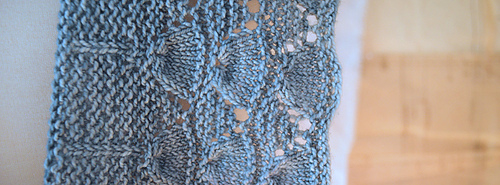patterns >  Blue Peninsula
Blue Peninsula
> Singing Beach










Singing Beach
Create Your Own Collection! When you purchase four individual Blue Peninsula patterns at the same time, you’ll automatically receive a 20% discount. No coupon code required. (This offer does not include ebooks and sets, which are already discounted.)
………………………………………
With its scalloped edges and garter-stitch lace, this cowl brings to mind seashells, waves, and shifting sands—memories of beautiful days at the beach. Worked in the round on a circular needle, Singing Beach uses just one skein of sock or fingering weight yarn—the perfect choice for that special skein in your stash. It works especially well with semi-solid, hand-dyed yarns like Watercolors II by the Periwinkle Sheep.
The cowl is named after a popular beach in Manchester-by-the-Sea, Massachusetts, where the sand “sings” or “squeaks” when walked upon. I have fond memories of taking the train to Singing Beach many years ago, when my sisters and I were young and shared an apartment in Boston. Those were carefree days!
Sizes: One
Finished (blocked) measurements:
5.25 inches/13 cm wide by 52 inches/132 cm circumference at bound-off edge
Yarn/Yardage:
330 yds/300 m fingering weight yarn. The sample was knit with 1 skein of Periwinkle Sheep Watercolors II 100% superwash merino wool; 400yd/366m per 100g skein in the Rhinebeck 2016 colorway.
Needles and notions:
--US #4/3.50mm 24- or 32-inch circular needle OR SIZE NEEDED TO OBTAIN GAUGE
--Stitch marker, tapestry needle, stainless steel T-pins
Construction:
Worked in the round beginning with the scalloped lace section and ending with the garter/slip stitch section.
Gauge:
18 sts/40 rows = 4”/10 cm in garter stitch after blocking
To save time, check gauge.
Notes:
--Stitch patterns are provided in written, line-by-line instructions (there are no charts).
--You may find that needles with pointy tips (rather than blunt) will work best for this cowl, which requires working k4tog and k4tog-tbl on some rounds.

1533 projects
stashed
1407 times
- First published: November 2016
- Page created: November 22, 2016
- Last updated: January 15, 2022 …
- visits in the last 24 hours
- visitors right now





